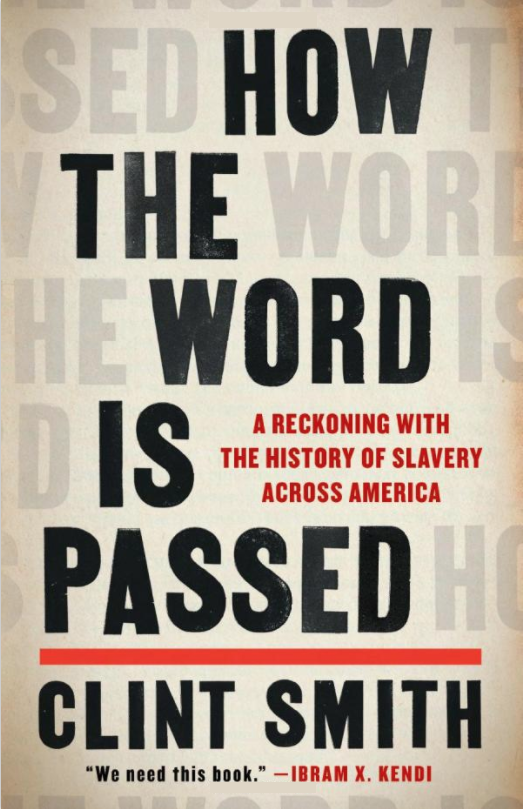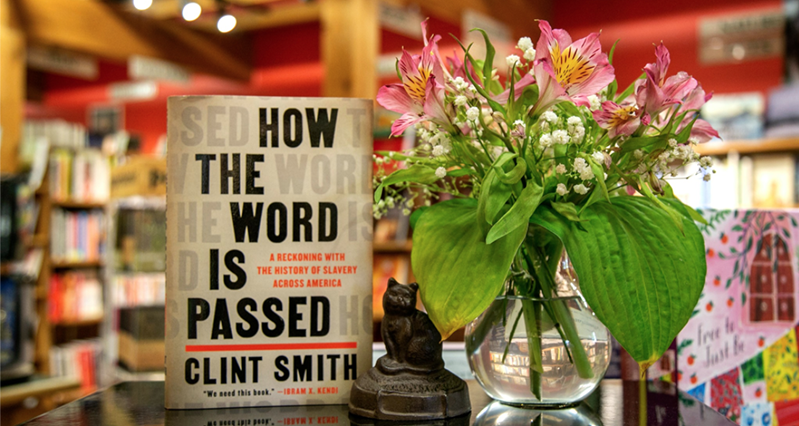||| A BOOK REVIEW by JENS KRUSE |||
With How the Word is Passed: A Reckoning with the History of Slavery Across America, Clint Smith has given us a remarkable book that I cannot recommend highly and urgently enough. Smith is a staff writer at The Atlantic and a published poet, and it shows, both in the quality of his reporting and in the poetic passion of his language.
Smith explains his motivation and his purpose in his ‘’Prologue’’:
It was in MAY 2017 – after the statue of Robert E. Lee near downtown New Orleans had been taken down from its sixty-foot
pedestal – that I became obsessed with how slavery is remembered and reckoned with, with teaching myself all of the things I wish someone had taught me long ago. Our country is in a moment, at an inflection point, in which there is a willingness to more fully grapple with the legacy of slavery and how it shaped the world we live in today. But it seems that the more purposefully some places have attempted to tell the truth about their proximity to slavery and its aftermath, the more staunchly other places have refused. I wanted to visit some of these places – those telling the truth, those running from it, and those doing something in between – to understand this reckoning. (6-7)

Smith uses these places – Monticello Plantation, The Whitney Plantation, Angola Prison, Blandford Cemetery, Galveston Island, New York City, Goree Island – as a lens through which we can see our history, and examine how we choose to remember, to ‘’fully grapple with’’ that history, or not.
It of course makes perfect sense that Smith begins his journey of discovery at Monticello, the place where the founding contradiction of our country is starkly present – that the man who wrote the Declaration of Independence, with its stirring assertion that ‘’all men are created equal,’’ was at the same time the owner of a plantation on which hundreds of human beings were enslaved.
As in all his chapters, Smith constructs his narrative here from a combination of his study of history, his own observations during his visit or visits to these places, interviews with the public historians in charge of telling the story of the site, and conversations with visitors and tour guides. At Monticello, which has tried to grapple with its history since 1993, Smith takes both the tour that tries to deal with Monticello’s history of slavery, and the so-called ‘’house tour.’’ He finds the first impressive and notices that the second barely mentions slavery. He also lets us know that the house tour is taken by many more people than the tour about slavery. His tour guide on the latter at some point tells him:
I’ve come to realize that there’s a difference between history and nostalgia, and somewhere between those two is memory (…) I think that history is the story of the past, using all the available facts, and that nostalgia is a fantasy about the past using no facts, and somewhere in between is memory, which is kind of this blend of history and a little bit of emotion … I mean, history is kind of about what you need to know … but nostalgia is what you want to hear. (41)
‘’Memory, which is kind of this blend of history and a little bit of emotion …’’ Smith shows us that blend of history and emotion, a lot of emotion, when, in his ‘’Epilogue,’’ he brings his journey back to himself, his grandparents, his ancestors, among them his grandfather’s grandfather, who was enslaved. He says:
My grandparents’ stories are my inheritance; each one is an heirloom I carry. Each one is a monument to an era that still
courses through my grandfather’s veins. Each story is a memorial that still sits in my grandmother’s bones. My grandparents’ voices are a museum I am still learning how to visit, each conversation with them a new exhibit worthy of my time. (288)
Here is one of those memorials:
The year my grandmother was born, the Florida Panhandle was burning hot with white terror. Black children were taught to keep their eyes down, their mouths shut, and to make it home before the sun dissolved behind the trees. The year my grandmother was born, the country was on the cusp of entering a war being fought across two oceans. Black men would be sent to fight for freedom and come back to a land where they didn’t have their own. The year my grandmother was born, she was held in her mother’s arms and had no way of knowing how soon that embrace would disappear and never return, how soon her mother’s face would become something she couldn’t remember. The year my grandmother was born, there were laws that wrapped themselves around the necks of everyone she knew, and no one knew if they would let go. (279)
Toward the end of his ‘’Epilogue,’’ Smith returns to the journey of remembrance and reckoning he has shared with us in the seven
chapters of his book:
Across the United States […] there are places whose histories are inextricably tied to the story of human bondage. Many of these places directly confront and reflect on their relationship to that history; many of these places do not. But in order for our country to collectively move forward, it is not enough to have a patchwork of places that are honest about this history while being surrounded by other spaces that undermine it. It must be a collective endeavor to learn and confront the story of slavery and how it has shaped the world we live in today. (289)
Clint Smith’s How the Word is Passed: A Reckoning with the History of Slavery Across America (New York: Little, Brown and Company, 2021) can be obtained through Darvill’s Bookstore and is available from the Orcas Library.









can’t wait to read it; thanks for the review, Jens.